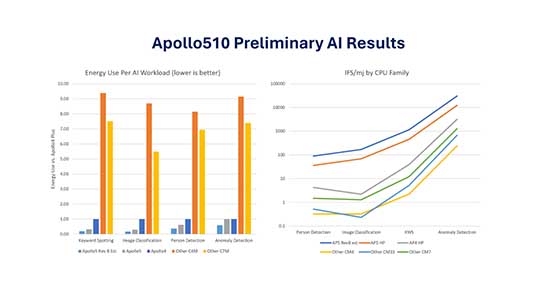Feature Highlights
- Apollo510, based on Arm Cortex-M55, delivers 30x better power efficiency and 10x faster performance compared to previous generations
- The ability to do AI/ML workloads concurrent with complex graphics, telco-quality voice applications, and always-on voice/sensor processing
- 4 MB on-chip NVM, 3.75 MB on-chip SRAM, and high bandwidth interfaces to off-chip memories
- 2.5D GPU with vector graphics acceleration for vibrant, crystal-clear, and smooth graphics, a 3.5x overall performance enhancement over the Apollo4 Plus family
- Support for Memory in Pixel (MiP) displays, typically found in the lowest-power products
- Robust security on Ambiq’s secureSPOT® platform with Arm TrustZone technology
AUSTIN, Texas — Ambiq, a technology leader in exceptionally energy-efficient semiconductors for IoT devices, is introducing the new Apollo510, the first member of the Apollo5 SoC family, which is uniquely positioned to kickstart the age of truly ubiquitous, practical, and meaningful AI.
The Apollo510 MCU is a complete overhaul of hardware and software that fully leverages the Arm® Cortex®-M55 CPU with Arm Helium™ to reach processing speeds up to 250MHz. The Apollo510 achieves up to 10x better latency while reducing energy consumption by around 2x, compared to Ambiq’s previous power efficiency leader, the Apollo4. This desirable combination of performance and efficiency allows our customers to deploy sophisticated speech, vision, health, and industrial AI models on battery-powered devices everywhere, making it the most efficient semiconductor on the market to operate with the Arm Cortex-M55.

“We at Ambiq have pushed our proprietary SPOT platform to optimize power consumption in support of our customers, who are aggressively increasing the intelligence and sophistication of their battery-powered devices year after year,” said Scott Hanson, Ambiq’s CTO and Founder. The new Apollo510 MCU is simultaneously the most energy-efficient and highest-performance product we’ve ever created.”
“As applications across health, industrial, and smart home continue to advance, the need for secure edge AI is crucial for next generation devices,” said Paul Williamson, SVP and GM, IoT Line of Business at Arm. “Ambiq’s new family of SoCs, built on Arm, will deliver significant performance gains for on-device AI, helping developers and device manufacturers deliver the capabilities required for the AI era.”
With more than 30x energy improvement, the Apollo510 is capable of running a vast majority of today’s endpoint AI calculations, including low-power sensor monitoring, always-on voice commands, telco-quality audio enhancement, and more. Manufacturers of IoT devices that perform AI/ML inferencing, such as next-gen wearables, digital health devices, AR/VR glasses, factory automation, and remote monitoring devices, can greatly expand their power budget while adding more capabilities to their devices through the Apollo510’s SPOT-optimized design.
Apollo510 contains everything needed for driving intelligent systems: ultra-efficient compute, expansive on-chip memories, high-bandwidth interfaces to off-chip memories, and security. Arm Helium technology on Apollo510 supports up to 8 MACs per cycle as well as half, full, and double precision floating point operations, making it ideal for AI calculations in addition to general signal processing operations. Apollo510 also improves its memory capacity over the previous generation with 4 MB of on-chip NVM and 3.75 MB of on-chip SRAM and TCM, so developers have smooth development and more application flexibility. For extra-large neural network models or graphics assets, Apollo510 has a host of high bandwidth off-chip interfaces, individually capable of peak throughputs up to 500MB/s and sustained throughput over 300MB/s.
Building upon Ambiq’s secureSPOT platform, Apollo510 integrates Arm TrustZone technology with a physical unclonable function (PUF), tamper-resistant OTP, and secure peripherals. These enhancements help designers establish a trusted execution environment (TEE) to develop secure, robust applications and scale their products faster.
IoT endpoint device manufacturers can expect unrivaled power efficiency to develop more capable devices that process AI/ML functions better than before. Targeted applications and industries include wearables, digital health, agriculture, smart homes and buildings, predictive maintenance, factory automation, and more.
The Apollo510 MCU is currently sampling with customers, with general availability in Q4 this year. It has been nominated by the 2024 embedded world community under the Hardware category for the embedded awards.
Meet us at the Embedded World Exhibition and Conference on April 9- 11, 2024, for a live product demonstration.













